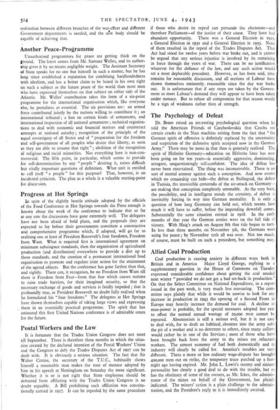The Psychology of Defeat
Dr. Benes raised an interesting psychological question when he told the American Frien& of Czechoslovakia that Czechs see certain cracks in the Nazi machine arising from the fact that " the German spirit of offensive is definitely replaced by the uncertainty and scepticism of the defensive spirit accepted now in the German Army." There may be more in that than is generally realised. The spirit of Hitlerite Germany—education on Hitlerite lines has now been going on for • ten years—is essentially aggressive, dominating, arrogant, unquestioningly self-confident. The idea of defeat has never been entertained. The thing was inconceivable. There is no sort of mental armour against such a conception. And now events which no censorship can hide—the defeat at Stalingrad, the defeat in Tunisia, the irresistible crescendo of the air-attack on Germany— are making that conception completely untenable. At the very least, the possibility, and in intelligent minds the certainty, of defeat is inevitably forcing its way into German mentality. It is only a question of how long Germany can hold out, which means how much it will have to suffer, before the impending downfall comes. Substantially the same situation existed in 1918. In the early months of that year the German armies were on the full tide of victory. With Haig's attack on August 8th that tide began to turn. In less than three months, on November 5th, the Germans were suing for peace ; by November 11th all was over. Not too much, of course, must be built on such a precedent, but something may.


























 Previous page
Previous page